FROM JOURNAL OF CLINICAL SLEEP MEDICINE
A novel device has shown a high rate of accuracy in predicting which patients with obstructive sleep apnea will best respond to treatment with an oral appliance, according to a study.
In this two-part study conducted by John E. Remmers, MD, of the University of Calgary (Alta.), 202 adults – primarily overweight, middle-aged men, diagnosed with moderate sleep apnea, were divided into two groups. The first included 149 people who were given a two-night, in-home, feedback controlled mandibular positioner (FCMP) test, followed by intervention with a custom-fitted oral appliance. The appliance was connected to a sensor to detect real-time respiratory events, and then moved the jaw to mitigate the sleep-disordered breathing. Outcomes data on the appliance’s performance in each individual was used to create a classification system to predict therapeutic outcomes in the second group of 53 study participants.
The investigators determined that the test had an 85% sensitivity level with 93% specificity, a positive predictive value of 97% and a negative predictive value of 72%. Of those who were predicted to respond to therapy, the mandibular protrusive position was efficacious in 86% of patients.
Some participants reported sore gums when using the device, but there were no long-lasting adverse events reported.
The high rate of accuracy for predicting who will derive the most benefit from the appliance, along with the demonstrated preference for oral appliances compared to continuous positive airway pressure devices among patients, increases the clinical utility of the appliance, and expands options for clinical management of sleep apnea, according to the study authors (Clin Sleep Med. 2017;13[7]:871-80).
On Twitter @whitneymcknight




